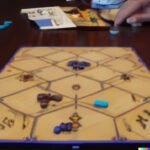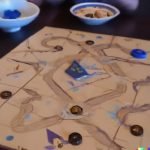Clue, the classic mystery board game, has been captivating players of all ages for decades with its intriguing whodunit premise. In this article, we will delve into the world of Clue and explore some key strategies to enhance your gameplay. Whether you’re a seasoned veteran or a newcomer to the game, these strategies will help you sharpen your detective skills and increase your chances of solving the mystery.
First introduced in 1949, Clue has become a timeless favorite among board game enthusiasts, known for its thrilling blend of deduction and strategy. With its engaging storyline and interactive gameplay, Clue continues to remain popular in today’s modern gaming landscape. Understanding the intricacies of this iconic game can make all the difference in emerging victorious as the ultimate sleuth.
In this section, we will provide an overview of Clue’s origins, rules, characters, and weapons to set the stage for exploring advanced gameplay strategies. From keeping track of other players’ movements to strategically making suggestions and accusations, mastering these techniques is essential for cracking the case in Clue. Get ready to step into the shoes of a detective and unravel the mysteries hidden within the walls of Tudor Mansion.
History of Clue
Clue, known as Cluedo in some regions, is a classic mystery board game that has captivated players for decades with its intriguing premise and engaging gameplay. Originally created in the United Kingdom during World War II, the game was designed by Anthony E. Pratt, a solicitor’s clerk, who came up with the concept as a way to pass the time during air raids. The game was later patented by Waddingtons in 1947 and released to the public.
Over the years, Clue has undergone various adaptations and updates to stay relevant in an ever-changing gaming landscape. From different editions featuring new characters and weapons to themed versions based on popular franchises like Harry Potter or Game of Thrones, Clue has managed to retain its core mechanics while offering fresh experiences for both new and seasoned players.
One of the most notable changes to the game occurred in 2008 when Hasbro introduced new character abilities and special powers in their “The Great Museum Caper” edition of Clue. This added layer of complexity provided players with even more strategic options to consider when trying to solve the mystery at hand.
Despite these updates, the essence of Clue as a deduction-based game where keen observation and logical reasoning are key remains unchanged, making it a timeless favorite among board game enthusiasts worldwide.
- Clue originated in the United Kingdom during World War II
- The game was created by Anthony E. Pratt
- Waddingtons patented Clue in 1947
- Clue has seen various adaptations and updates over the years
- Hasbro introduced new character abilities and special powers in 2008
- The core mechanics of deduction remain central to Clue
Rules of Clue
Clue, also known as Cluedo in some countries, is a classic mystery board game that has entertained players for decades. The game involves solving a murder mystery by deducing the culprit, weapon, and location of the crime. With its intriguing premise and element of deduction, Clue has stood the test of time and remains a favorite among board game enthusiasts.
The basic rules of Clue are simple yet engaging. Players take on the roles of various characters such as Miss Scarlet, Colonel Mustard, Mrs. White, and more. The objective is to move around the game board to gather clues and ultimately make an accusation about the suspect, weapon, and room involved in the murder. Throughout the game, players must strategically ask questions to eliminate possibilities and solve the mystery before their opponents do.
One key strategy in playing Clue effectively is to pay close attention to other players’ movements and deductions. By observing which cards are shown or requested during gameplay, a player can deduce valuable information about which cards they may hold or what they may be trying to learn.
This tactic allows for informed decision-making when making suggestions or accusations based on gathered clues. Being attentive to these details can give a player a significant advantage in unraveling the mystery and emerging victorious in Clue.
| Aspect | Description |
|---|---|
| Players | 3-6 players |
| Objective | Solve the murder mystery by deducing the correct suspect, weapon, and location |
| Gameplay | Moving around the board to make suggestions or accusations based on gathered clues |
Characters and Weapons
In the classic mystery board game Clue, known for its intriguing storyline and detective-style gameplay, players must solve a murder by deducing the culprit, location, and weapon used in the crime. One of the distinctive features of Clue is the variety of characters and weapons available for players to choose from. Each character brings a unique personality to the game, while each weapon adds an element of surprise and strategy.
Some of the iconic characters in Clue include Miss Scarlett, Colonel Mustard, Mrs. White, Mr. Green, Mrs. Peacock, and Professor Plum. These characters not only provide diversity but also add depth to the narrative of the game. On the other hand, weapons like the revolver, candlestick, rope, wrench, lead pipe, and knife offer different paths for players to explore when making suggestions and accusations during gameplay.
To excel in Clue and increase your chances of winning, it is essential to understand how each character and weapon can influence your strategy. For example, certain characters may have advantages or disadvantages based on their starting locations on the board or their proximity to key rooms where most actions take place. Similarly, weapons can play a crucial role in diverting attention or misleading opponents during investigations.
| Characters | Weapons |
|---|---|
| Miss Scarlett | Revolver |
| Colonel Mustard | Candlestick |
Strategy #1
One of the key aspects of mastering Clue, the classic mystery board game, is to pay close attention to other players’ movements and deductions. Keeping track of where your opponents are moving on the board can give you valuable clues about the cards they hold and the rooms they are trying to reach. By observing their actions, you can start to build a picture of which cards they may possess, helping you make more informed decisions in your own strategy.
Additionally, paying attention to how other players respond to suggestions and accusations can provide important insights into the cards they have in their hands. If a player quickly disproves a suggestion, it likely means that one of the cards shown is in their possession.
This information can be crucial in narrowing down possibilities and making deductions about the remaining unknown cards. By staying alert and observant during gameplay, you can gain an advantage by strategically using this information to your benefit.
Understanding each player’s deductions and movements also allows you to anticipate their next moves and adjust your own strategies accordingly. By predicting their intentions based on their actions, you can position yourself strategically on the board or make suggestions that might throw them off course.
This proactive approach not only helps you stay ahead in the game but also adds an element of psychological gameplay that can enhance your overall Clue experience. By mastering this first strategy, you set a strong foundation for success in unraveling the mystery and solving the case before your opponents do.
Strategy #2
In the game of Clue, making accurate suggestions and accusations is crucial to identifying the culprit, weapon, and room involved in the murder mystery. Here are some strategic tips to help you make the most of your turns and increase your chances of solving the case:
- When making suggestions, consider what information you hope to gain from it. Try to choose a character or weapon that will provide you with valuable clues based on the cards you already have.
- Take note of which cards are shown or not shown to you during other players’ turns. This can give you insights into which cards they might hold, helping you deduce missing pieces of the puzzle.
- Be mindful of the timing of your suggestions and accusations. Sometimes, strategically delaying an accusation can give you more time to gather information and make an informed decision.
Utilizing these tips can greatly enhance your gameplay experience in Clue by enabling you to make more informed decisions and deductions based on the clues available to you. Remember that each move matters in this game of deduction and strategy, so approach each suggestion and accusation thoughtfully.
- Consider using suggestions as a way to eliminate possibilities rather than just trying to guess the exact solution in one go. Gradually narrowing down your options can lead you closer to uncovering the truth.
- Pay attention to how other players react to your suggestions. Their responses or lack thereof can also provide helpful clues about the contents of their hands and their suspicions about the case.
- When making an accusation, make sure you have carefully considered all possible combinations before deciding on your final guess. Accusing too early without sufficient evidence can set you back in your investigation.
By incorporating these strategic approaches into your gameplay, you can enhance your skills as a detective in Clue and increase your chances of solving the mystery before your opponents do. So sharpen your deductive reasoning skills, keep track of clues throughout the game, and remember that success in Clue often comes down to clever tactics and calculated risks.
Strategy #3
Utilizing the process of elimination is a crucial strategy when playing Clue, as it helps narrow down the possible solutions to the mystery. By systematically eliminating options based on deductions and card reveals throughout the game, players can increase their chances of correctly identifying the suspect, weapon, and room. This strategy requires careful observation, logical thinking, and attention to detail.
Keeping Track of Clues
One key aspect of utilizing the process of elimination is keeping track of all the clues that are revealed during the game. This includes paying attention to which cards are shown or not shown during suggestions made by other players, as well as noting any responses given by opponents. By carefully documenting this information and cross-referencing it with your own hand of cards, you can start to eliminate possibilities and focus on what remains unknown.
Logical Deductions
Making logical deductions is another important part of utilizing the process of elimination in Clue. For example, if a player suggests a specific suspect in a room where you already know one of those elements is not present in your hand of cards, you can deduce that the suggested suspect is not guilty.
Similarly, if multiple players show you the same card when they are asked about different suggestions, you can deduce that card must be in their hands and use that information to further eliminate possibilities.
By effectively utilizing the process of elimination, players can strategically narrow down possible solutions in Clue and increase their chances of solving the mystery before their opponents. This methodical approach requires patience and careful consideration but can be highly rewarding when successfully implemented. Remember to stay observant, think critically, and leverage all available information to crack the case in this classic detective game.
Advanced Strategies
When it comes to mastering Clue, the classic mystery board game, advanced strategies can make a significant difference in your gameplay. These expert-level tips and tricks can help you navigate through the intricate web of clues and deductions to ultimately solve the mystery before your opponents. By incorporating these advanced strategies into your gameplay, you can elevate your Clue skills and increase your chances of emerging victorious in this thrilling detective game.
Strategy #1: Mind Games and Misdirection
One crucial aspect of advanced Clue gameplay is the art of misdirection. To keep your opponents on their toes, consider making suggestions that lead them away from the actual solution. By strategically planting seeds of doubt or confusion, you may be able to steer others towards false conclusions while maintaining a clear path towards solving the mystery yourself. Remember to use subtlety and cunning in your approach to throw off suspicion and gain an upper hand in the game.
Strategy #2: Bluffing and Psychology
In high-stakes games of Clue, mastering the art of bluffing can be a game-changer. By strategically bluffing about your own cards or intentions, you can manipulate other players’ perceptions and lead them astray. Utilize psychology to your advantage by reading your opponents’ reactions and responses to deduce valuable information without giving away too much about your own hand. A well-executed bluff can disrupt your competitors’ strategies and give you a strategic edge in solving the mystery first.
Conclusion
In conclusion, mastering the art of Clue goes beyond just luck and guesswork; it requires strategic thinking and careful observation of your opponents’ moves. By employing the key strategies discussed in this article, such as keeping track of other players’ movements, strategically making suggestions and accusations, and utilizing the process of elimination, players can significantly enhance their chances of solving the mystery efficiently.
Furthermore, advanced Clue players can take their skills to the next level by incorporating expert-level tips and tricks into their gameplay. These advanced strategies may involve more complex deductions, psychological tactics, or even bluffing to mislead opponents. As with any game, practice makes perfect, so honing these techniques through repeated gameplay will undoubtedly improve one’s performance in Clue.
Next time you gather around the table for a game of Clue with friends or family, be sure to put these strategies to the test. Whether you are a seasoned player looking to up your game or a beginner eager to learn the ropes, implementing these tactics will undoubtedly add new layers of excitement and challenge to your Clue experience.
Remember, in Clue, the key to victory lies not only in solving the mystery but also in outsmarting your opponents along the way.
Frequently Asked Questions
What Is the Best Strategy for Clue?
The best strategy for Clue involves paying close attention to the information gathered during the game. Keep track of which cards are shown and which ones are not, in order to narrow down the possibilities and make logical deductions.
What Are Suggestions for Clue Game?
Suggestions for playing Clue include actively participating in discussions with other players to gather more information. Additionally, try to keep a poker face when showing your own cards to avoid giving away too much information about your hand.
How Do You Spice Up Clue?
To spice up a game of Clue, consider introducing house rules or additional gameplay elements. You could create custom character abilities, introduce new weapons or rooms, or even add a time limit to increase the tension and excitement of the game. Adding these variations can make each game of Clue feel fresh and unique.

I love playing all kinds of games – from classics like Monopoly to modern favourites like Ticket to Ride.
I created this blog as a way to share my love of board games with others, and provide information on the latest releases and news in the industry.





